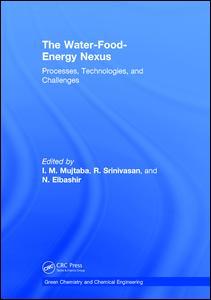Description
The Water-Food-Energy Nexus
Processes, Technologies, and Challenges
Green Chemistry and Chemical Engineering Series
Coordinators: Mujtaba I. M., Srinivasan R., Elbashir N. O.
Language: English
Subjects for The Water-Food-Energy Nexus:
Publication date: 09-2017
· 17.8x25.4 cm · Hardback
Publication date: 09-2017
· 17.8x25.4 cm · Paperback
Description
/li>Contents
/li>Biography
/li>
Exponential growth of the worldwide population requires increasing amounts of water, food, and energy. However, as the quantity of available fresh water and energy sources directly affecting cost of food production and transportation diminishes, technological solutions are necessary to secure sustainable supplies. In direct response to this reality, this book focuses on the water-energy-food nexus and describes in depth the challenges and processes involved in efficient water and energy production and management, wastewater treatment, and impact upon food and essential commodities. The book is organized into 4 sections on water, food, energy, and the future of sustainability, highlighting the interplay among these topics. The first section emphasizes water desalination, water management, and wastewater treatment. The second section discusses cereal processing, sustainable food security, bioenergy in food production, water and energy consumption in food processing, and mathematical modeling for food undergoing phase changes. The third section discusses fossil fuels, biofuels, synthetic fuels, renewable energy, and carbon capture. Finally, the book concludes with a discussion of the future of sustainability, including coverage of the role of molecular thermodynamics in developing processes and products, green engineering in process systems, petrochemical water splitting, petrochemical approaches to solar hydrogen generation, design and operation strategy of energy-efficient processes, and the sustainability of process, supply chain, and enterprise.
Section I: Water 1. Desalination 1.1 Model-Based Techniques in Desalination Processes: A Review 1.2 Addressing the Global Water–Energy Challenge through Energy-Efficient Desalination 1.3 Forward Osmosis for Irrigation Water Supply Using Hybrid Membrane System for Draw Solution Regeneration 2. Water Management 2.1 Toward Sustainable Water Management in Industrial Cities 2.2 Optimal Water Network Synthesis [Munawar A. Shaik] 2.3 Rationalization of Water Quality Monitoring Network 3. Wastewater Treatment 3.1 Appropriate Interventions and Technologies for Providing Safe Drinking Water to Rural and Underprivileged Communities 3.2 Toward the Synthesis of Wastewater Recovery Facilities Using Enviroeconomic Optimization 3.3 Water Conservation, Reuse, and Challenges: A Case Study Performed at Amul Dairy 3.4 Occurrence, Effects, and Treatment of Endocrine-Disrupting Chemicals in Water Section II: Food4. Advances in Cereal Processing: An Approach for Energy and Water Conservation 5. Clean Energy Technologies for Sustainable Food Security 6. Bioenergy and Food Production: Appropriate Allocation for Future Development 7. Uses of Water and Energy in Food Processing 8. A General Model for Food Cooking Undergoing Phase Changes Section III: Energy9. Fossil Fuel 9.1 Energy Efficient Thermal Retrofit Options for Crude Oil Transport in Pipelines 9.2 Process Industry Economics of Crude Oil and Petroleum Derivatives for Scheduling, Planning, and Feasibility Studies 10. Bio Fuel 10.1 Environmentally Benign Biodiesel Production from Renewable Sources 10.2 Process for Synthesis of Biodiesel from Used Cooking Oil: Feasibility and Experimental Studies 11. Synthetic Fuel and Renewable Energy 11.1 Gas-to-liquid (GTL)-Derived Synthetic Fuels: Role of Additives in GTL-Derived Diesel Fuels 11.2 The Role of Alternative Aviation Fuels on Reducing the Carbon Footprint 11.3 Integration of Distributed Renewable Energy Generation with Customer-End Energy Management System for Effective Smart Distribution Grid Operation 11.4 Evaluation and Modeling of Demand and Generation at Distribution Level for Smart Grid Implementation 11.5 A Process to Model Fischer–Tropsch Reactors 12. Carbon Capture 12.1 Application of Rotating Packed Bed Technology for Intensified Postcombustion CO2 Capture Based on Chemical Absorption 12.2 Process Simulation and Integration of Natural Gas Combined Cycle (NGCC) Power Plant Integrated with Chemical Absorption Carbon Capture and Compression 12.3 Postcombustion CO2 Capture Based on Chemical Absorption in Power Plants 12.4 Operation of Supercritical Coal-Fired Power Plant (SCPP) Integrated with CO2 Capture under the UK Grid Code 12.5 Whole System Experimental and Theoretical Modeling Investigation of the Optimal CO2 Stream Composition in the Carbon Capture and Sequestration Chain 12.6 Performance of Porous Covalent Organic Polymers for CO2 Capture at Elevated Pressure 12.7 Postcombustion Carbon Capture Using Polymeric Membrane Section IV: Sustainable Future13. The Role of Molecular Thermodynamics in Developing Industrial Processes and Novel Products That Meet the Needs for a Sustainable Future 14. Green Engineering in Process Systems: Case Study of Chloromethanes Manufacturing 15. Fundamental Aspect of Photoelectrochemical Water Splitting 16. Photoelectrochemical Approaches to Solar-H2 Generation 17. Design and Operating Strategy Innovations for Energy-Efficient Process Operation 18. Evaluating Sustainability of Process, Supply Chain, and Enterprise: A Bio-Based Industry Case Study
Iqbal M. Mujtaba is a Professor of Computational Process Engineering and currently the Head of School of Engineering at the University of Bradford. He obtained his BSc Eng and MSc Eng degrees in Chemical Engineering from Bangladesh University of Engineering & Technology (BUET) in 1983 and 1984 respectively and obtained his PhD from Imperial College London in 1989. He is a Fellow of the IChemE, a Chartered Chemical Engineer, and the current Chair of the IChemE's Computer Aided Process Engineering Subject Group. He was the Chair of the European Committee for Computers in Chemical Engineering Education from 2010-2013.
Rajagopalan Srinivasan is a Professor of Chemical Engineering and Institute Chair at Indian Institute of Technology Gandhinagar. Previously, he was with the National University of Singapore and AStar’s Institute of Chemical & Engineering Sciences. Raj received his B.Tech from Indian Institute of Technology Madras in 1993 and PhD from Purdue University in 1998, both in Chemical Engineering. He was a research associate in Honeywell Technology Center, Minneapolis, before joining NUS.
Nimir Elbashir holds a joint appointment as a Professor in the Chemical Engineering Program and the Petroleum Engineering Program at Texas A&M University at Qatar and he is the Director of Texas A&M’s Gas and Fuels Research Center; a major research center that involves 27 faculty members from both the Qatar and College Station campuses of Texas A&M University (http://gfrc.tamu.edu/). He has extensive research and teaching experience from four different countries around the world, including his previous position as researcher at BASF R&D Catalysts Center in Iselin, New Jersey.




